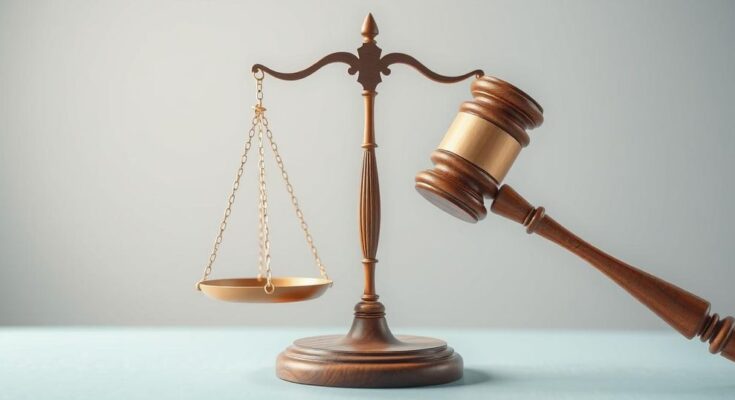Uganda’s Supreme Court ruled that military trials of civilians are unconstitutional, requiring that ongoing cases be moved to civilian courts. This decision is hailed as a victory for human rights. The ruling highlights ongoing abuses in military trials and calls for justice for civilians wrongfully convicted.
On January 31, 2025, Uganda’s Supreme Court declared the military trials of civilians unconstitutional, a significant advancement for human rights in the country. The ruling ordered an immediate cessation of such trials and mandated that ongoing military cases involving civilians be transferred to civilian courts. However, it refrained from nullifying previous convictions under the military system.
The Supreme Court’s decision represents a crucial protection for the right to a fair trial in Uganda. Oryem Nyeko, a senior Africa researcher at Human Rights Watch, emphasized the necessity for the government to address injustices faced by civilians wrongfully convicted in military trials, as well as those still awaiting trial.
Historically, military courts in Uganda have adjudicated numerous civilian cases, often including political adversaries and critics of the government. These trials have frequently violated both domestic and international standards for judicial fairness and due process, infringing upon rights guaranteed by the Ugandan Constitution.
The creation of military courts was established by the 2005 Uganda Peoples’ Defence Forces (UPDF) Act, which allows military trials for individuals “subject to military law.” Such courts lack the requirement for legal qualifications among military personnel, who are selected by military leadership committees. These courts have been known to impose severe penalties, including the death penalty.
Reports from Human Rights Watch in 2011 highlighted persistent failures among military courts to uphold international legal standards, notably regarding the rights of defendants to present their defense and protection against coerced confessions. Allegations of torture during military detentions have also been substantiated.
Despite earlier rulings, including a 2021 Constitutional Court decision against military trials for civilians, Ugandan authorities continued these practices, particularly targeting opposition leaders and critics. Recently, opposition leader Kizza Besigye faced trial in a military court while several NUP supporters received harsh sentences after lengthy pretrial detentions.
In January 2025, military courts punished legal representatives of opposition figures, reflecting ongoing harassment of individuals opposing military trials. This included sentencing attorney Eron Kiiza to prison without legal counsel for contempt, following an incident where he protested treatment in court.
President Museveni’s administration has openly supported military trials, claiming civil courts have inadequately addressed violent crimes. However, such practices are universally recognized as contrary to fair trial rights under national and international laws, prompting the African Commission on Human and Peoples’ Rights to advise against military jurisdiction over civilians.
Following the Supreme Court’s ruling, it is imperative for Ugandan authorities to re-evaluate cases of civilians previously tried in military courts. Establishing effective remedies for unjust detentions and ensuring comprehensive investigations into abuse allegations are critical steps toward restoring justice.
Nyeko remarked on the misuse of military courts against dissenters, characterizing the Supreme Court’s ruling as a pivotal stride toward accountability and justice for affected citizens.
The recent ruling by Uganda’s Supreme Court against military trials for civilians signifies a landmark moment in the country’s human rights journey. Previously, military courts were employed frequently to prosecute civilians, often undermining their rights to a fair trial, thereby raising international concern. The longstanding jurisdiction conflicts between military and civilian courts have spurred criticism from various human rights entities advocating for the rule of law and judicial integrity in Uganda.
The Supreme Court of Uganda’s ban on military trials for civilians marks a critical victory for human rights, ensuring adherence to fair trial standards. It underscores the need for accountability for wrongful convictions and mistreatment of civilians under military jurisdiction. As the judiciary asserts its independence, the Ugandan government is urged to undertake necessary reforms that prioritize citizens’ rights and uphold justice.
Original Source: www.hrw.org




